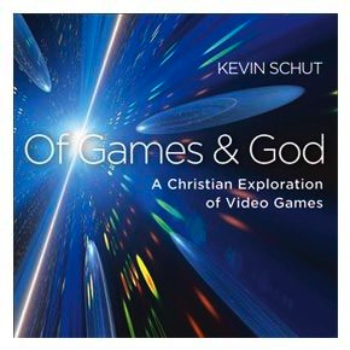 Video games matter. They may seem like trifles, or something that only belongs to a weird subculture. Some argue they only matter because they’re a big business. Others argue they matter because they’re a cultural threat. All of these observations are partly true, but they miss a bigger point: the video game is a unique medium that has potential we are just starting to tap. And just like other media, video games have the potential to hurt us and to bless us.
Video games matter. They may seem like trifles, or something that only belongs to a weird subculture. Some argue they only matter because they’re a big business. Others argue they matter because they’re a cultural threat. All of these observations are partly true, but they miss a bigger point: the video game is a unique medium that has potential we are just starting to tap. And just like other media, video games have the potential to hurt us and to bless us.
Dr. Kevin Schut will talk about his journey as a scholar of video games and video game culture in his inaugural public lecture as a full professor at Trinity Western University next Thursday (September 18).
Through a mix of research, game images, autobiography and game demonstrations, Of Games and God: A Christian Exploration of Video Games will wrestle with the implications of video games for Christians. Kevin will explain why he believes, in spite of the many challenges and problems, that games can be a tremendously redemptive medium.
Following is an article – Colonization in Europa Universalis IV – he wrote recently for Gamechurch; It is re-posted by permission.
Taking over the world is a lot of fun, but I sometimes wonder if it’s a bad idea. And even if you personally don’t like colonizing, it’s quite likely there are parts of your games you might want to reconsider.
I should probably explain. I am obsessed with strategy games. I especially like the historical ones that allow me to establish and grow European colonies in the Americas and other parts of the world.
After a couple of weeks of playing the sprawling empire-builder Europa Universalis IV (EU4) back in May, I had to stop, because I couldn’t make myself go to bed before 2 am.
Maybe I like these games because they are definitely not Mario or Call of Duty: I have terrible reflexes. I know part of the appeal is how strategy games force to me to think, and think hard. But I’m also pretty certain that part of the reason I like these games is the narrative, and that’s where the problems start.
EU4 doesn’t have a story in the same sense as The Last of Us, or even Divekick. There are no cutscenes or fleshed-out characters. But it’s still very narrative: it allows the player to reenact the experience of nations exploring uncharted territory, expanding via colonization or conquest, economically exploiting untapped resources or labour forces, and exterminating obstacles such as hostile people groups.
This is the 4X story (explore, expand, exploit, exterminate). And because most players have at least a rough sense of the conquest of the so-called New World, the richer a player’s understanding, the more that person can imagine being a part of that historical process.
If you are like me, you grew up with the heroic narrative of the European experience in the Americas. Faced by potentially overwhelming obstacles of bad weather, disease, crop failure, hostile natives and screwed up politics back in the home country, small bands of hardy folk managed to utilize simple technology to carve a settled and increasingly prosperous land out of a sullen and uncooperative wilderness. You know the stories: Magellan sailing around the world, Peter Minuit founding New Amsterdam, Cortes conquering the Aztecs and so on. It is fun to be part of that story.
But of course, we know that wasn’t the whole story. Brave and hardy as these Europeans were, they also spread misery, oppression and death wherever they went. If you haven’t heard this side of the story, you’ve been hiding under a rock. European disease probably killed over half the population of the Caribbean basin (that’s millions of people!). Entire civilizations were wiped out, others enslaved and still others assimilated or treated like dirt for having the wrong skin colour or language.
You might bridle at what you perceive as political correctness, dear reader, but the facts of these travesties are, as a whole, undeniable. It really, really sucked to be on the wrong side of the colonization narrative.
So take a look at how EU4 deals with this. To start with, everything’s done at the level of a global maps. Units are little men walking on this map. The game can’t avoid the conquest and assimilation stuff, so it deals with it at a high level. The European power sends a colonist to establish a colony in a territory that has a native population ranked by numbers, how likely they are to attack and how fierce they are in attack. They can give a trade bonus if properly placated, and when the colony reaches city status, the native population disappears, assimilated by the Europeans.
That’s it. An entire people group seen as either an obstacle or resource, and nothing more. And it’s bloodless.
Now, of course, everything in the game is simplified from real life, and everything is presented at a high level without details – building extra fortifications simply changes some icons. The player has to imagine settlers clearing fields, building shelter, trading with neighbours and so on. But it is also possible to imagine genocide and slavery, even if the game discourages such icky thoughts.
So now I’ve come to the spot that many of us gamers get to eventually. What I do with games that have me do things that I know are not right? The number of possible answers is quite large, but I want to focus on two opposite extremes that I think are equally problematic, albeit for very different reasons. On the one hand, we have the option of total purification, and on the other hand, we have the option of anything goes.
The purification position says that watching, reading, listening and playing with stuff that contains evil is right out. Watching popular HBO series with graphic sex scenes is effectively supporting the industry’s exploitation of women. Shooting civilians in the ‘No Russian’ level is far too similar to actual mass murders. Playing EU4 is akin to sanctioning the massacre of native American populations.
This is, of course, anathema to your typical gamer. “Away from me, you idiots!” we might cry. Nobody dies in Call of Duty! Torturing the citizens of Tropico amounts to some changed pixels! No sheep are actually harmed in Minecraft! Such thinking leads to excessive exclamation points AND GAMERS COMPLAINING IN CAPS LOCK!!!
As I’ve said, however, I think both extremes are off-base. It’s true that advocates of the purification position sometimes oversimplify what playing a video game is like. But that’s not my primary objection – partly because there are very smart cultural critics who know very well that the gun on the screen isn’t physically real.
No, my objection to the purification position is the apparent belief that we can remove ourselves from impurity, and the assumption that any exposure to impurity must automatically pollute us.
First, it’s possible, to learn from brokenness. There are a lot of good movie examples: Blood Diamond shows the horrors of civil war, but condemns it. Perhaps examining the systems that led to European colonization will help me to understand it better. Second, we can’t really run away. All forms of culture – even those that seem most innocent – are partly screwed up, because all of humanity is partly screwed up. So where are we going to retreat to?
But that doesn’t mean we should go around seeking depravity! I think many gamers too easily blow off the problems in games. Saying a game is “just pixels” or “just a game” totally ignores the fact that Call of Duty wouldn’t be nearly as popular if it was Call of Niceness, where everyone racked up points by running around hugging everyone else.
The fact is, hardcore gamers like the military narrative, the smell of virtual gunpowder in the (very early) morning. We can’t have it both ways: we can’t say that we love the setting and artwork and the story and then say it doesn’t matter to us because it’s not real.
So how should I play EU4? I don’t like the idea of abandoning it altogether (although I may come to that decision), but I can’t play it without caring (although I may decide to play it). Instead, I want to play with awareness that helps me think through my play and guides my actions.
By awareness, I mean I need to actually pay attention to what I’m playing, what it means to me and others, and what I’m enjoying and not enjoying about it. Until I really think through what it means to colonize an already-settled territory, it’s hard for me to really play EU4 in a thoughtful way.
Once I’m aware, though, I can actually wrestle with the meaning of the game, and figure out what I actually believe about it. And once I’m thinking about it, I can actually do something about it. I can decide, for instance, to play peacefully. Or I can treat the gameplay as an experiment, a kind of roleplay that allows me to see how history unfolded. Or I can decide to quit the game altogether.
There isn’t a single right answer. But the point is that when we need to move away from the overly simple response of dropping anything vaguely objectionable and equally simple response that everything’s fine. We need to play mindfully.
Kevin Schut’s lecture will be based, in part at least, on the book he published last year: Of Games and God: A Christian Exploration of Video Games. The introduction and first chapter (and three brief explanatory videos) are available on the Baker Publishing Group site.



